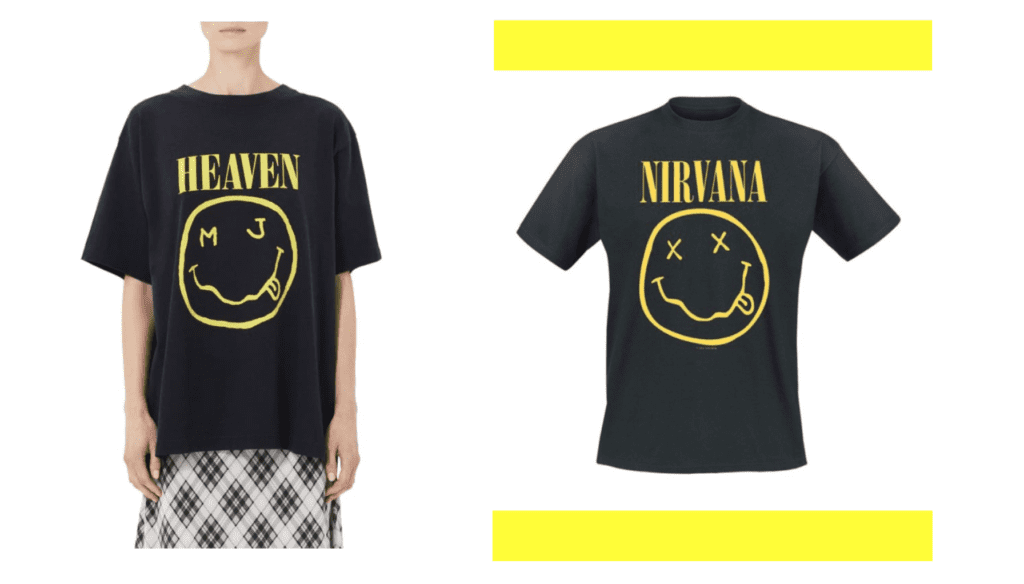The fight between Nirvana and Marc Jacobs is heating up. On the heels of California federal court judge refusing to dismiss the case that the 90s-era band filed against the New York-based fashion brand for allegedly hijacking its famed smiley face graphic for a collection of high fashion grunge wares, Marc Jacobs have formally denied liability for copyright and trademark infringement, arguing that their use of the graphic is “protected by free speech” and asking the court to formally invalidate Nirvana LLC’s copyright registration for it.
In Marc Jacobs’ answer to the nearly one-year-old Nirvana case, the LVMH Moët Hennessy Louis Vuitton-owned fashion brand and its fellow defendants Saks Fifth Avenue and Neiman Marcus deny – for a whole host of reasons – that they “infringed Nirvana’s copyright [in the nearly 30 year old smiley face design], misleadingly used Nirvana’s common law trademarks [in the smiley], and utilized other elements with which Nirvana is widely associated to make it appear that Nirvana has endorsed or is otherwise associated with defendant Marc Jacobs’ ‘Bootleg Redux Grunge’ collection … when, in fact, Nirvana has not done so and is not so associated.”
For one thing, Nirvana’s copyright infringement claim is barred because its registration in the almost-3-decades-old “X-Eye Smiley Face” design is “invalid and/or unenforceable,” according to the defendants. “Nirvana is not the original creator of … all of the elements of the work covered by the registration,” Jacobs and co. claim, and the registration for the smiley design “covers multiple different works published separately at different times, yet was registered as a single work,” making the registration impermissible.
Marc Jacobs claims that Nirvana LLC also fails to make its case for trademark infringement. “There can be no likelihood of confusion” – and thus, no trademark infringement cause of action – they claim, since Marc Jacobs’ “products include [its own] distinctive trademark MARC JACOBS,” making it unlikely that consumers would be confused about the source of the Marc Jacobs’ products bearing the smiley face design. (Likelihood of confusion is the central element in a trademark infringement claim.)
In addition to denying Nirvana’s claims, Marc Jacobs sets forth a whopping 15 affirmative defenses, which are facts other than those alleged by the plaintiff, which, if proven by the defendants, defeat or mitigate the legal consequences of the defendants’ otherwise unlawful conduct.
Among the affirmative defenses: Marc Jacobs argues that the inclusion of the lookalike smiley face on grunge garments amounts to “an expressive message protected by free speech principles,” and thus, the brand is shielded from infringement liability. Such use is also protected by fair use, per Jacobs, which claims that “the market for [Nirvana’s] allegedly registered work is not harmed, as [MJ’s products are] not a replacement for consumers wanting to associate with [Nirvana].”
One of the most interesting defenses is Marc Jacobs’ argument that Nirvana’s claims are barred by the doctrine of acquiescence, a legal concept that comes about when a person knowingly fails to raise any objections to the infringement of his/her rights prior to filing suit, and thus, essentially consents to such otherwise infringing use. The consenting person in this scenario? Courtney Love, the widow of late Nirvana front man Kurt Cobain and “one of the owners of Nirvana, LLC.”
Jacobs argues that Love “was in negotiations with [Marc Jacobs] to participate in the release of the Redux Grunge Collection, as well as the accused products” prior to their release, which “was a reasonable interpretation” of her consent to such use by the Jacobs brand.
According to Jacobs, Love’s knowledge of and lack of objections to its plans to use the Nirvana-inspired smiley face and other band-specific elements – and likely given Love’s longstanding relationship with the fashion brand; including her appearance in its Fall/Winter 2016 ad campaign, and her daughter Frances Bean Cobain appeared in its Spring/Summer 2017 ad – prevent Nirvana LLC from bringing such infringement claims after the fact.
Marc Jacobs says that it “relied upon [Love’s] acquiescence and has invested large sums in reliance thereon,” which prevents Nirvana from taking action against the brand for “any acts [that might otherwise] constitute an infringement of [Nirvana’s] alleged rights.”
In addition to asserting these defenses and denials, Marc Jacobs sets forth a claim of its own against Nirvana LLC, asking the court to declare that Nirvana’s copyright registration for the smiley face design is “invalid and unenforceable,” and to dismiss Nirvana’s complaint in its entirety.
*The case is Nirvana LLC v. Marc Jacobs International, LLC, et al., 2:18-cv-10743 (C.D.Cal).














